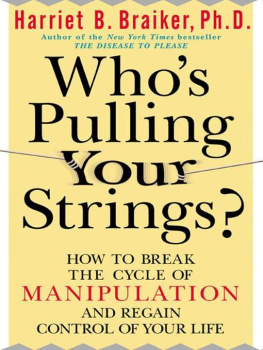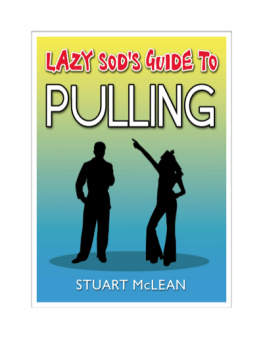Harriet Braiker - Who’s Pulling Your Strings
Here you can read online Harriet Braiker - Who’s Pulling Your Strings full text of the book (entire story) in english for free. Download pdf and epub, get meaning, cover and reviews about this ebook. year: 0, genre: Science. Description of the work, (preface) as well as reviews are available. Best literature library LitArk.com created for fans of good reading and offers a wide selection of genres:
Romance novel
Science fiction
Adventure
Detective
Science
History
Home and family
Prose
Art
Politics
Computer
Non-fiction
Religion
Business
Children
Humor
Choose a favorite category and find really read worthwhile books. Enjoy immersion in the world of imagination, feel the emotions of the characters or learn something new for yourself, make an fascinating discovery.
- Book:Who’s Pulling Your Strings
- Author:
- Genre:
- Year:0
- Rating:4 / 5
- Favourites:Add to favourites
- Your mark:
- 80
- 1
- 2
- 3
- 4
- 5
Who’s Pulling Your Strings: summary, description and annotation
We offer to read an annotation, description, summary or preface (depends on what the author of the book "Who’s Pulling Your Strings" wrote himself). If you haven't found the necessary information about the book — write in the comments, we will try to find it.
Who’s Pulling Your Strings — read online for free the complete book (whole text) full work
Below is the text of the book, divided by pages. System saving the place of the last page read, allows you to conveniently read the book "Who’s Pulling Your Strings" online for free, without having to search again every time where you left off. Put a bookmark, and you can go to the page where you finished reading at any time.
Font size:
Interval:
Bookmark:
Whos Pulling Your Strings?
The September 11 Syndrome
The Disease to Please
Lethal Lovers and Poisonous People
Getting Up When Youre Feeling Down
The Type E Woman
Whos Pulling Your Strings?
How to Break the Cycle of Manipulation and Regain Control of Your Life
Harriet B. Braiker, Ph.D.
McGraw-Hill
New York Chicago San Francisco Lisbon London Madrid Mexico City Milan New Delhi San Juan Seoul Singapore Sydney Toronto

Copyright 2004 by Harriet B. Braiker, PhD. All rights reserved. Manufactured in the United States of America. Except as permitted under the United States Copyright Act of 1976, no part of this publication may be reproduced or distributed in any form or by any means, or stored in a database or retrieval system, without the prior written permission of the publisher.
0-07-143568-9
The material in this eBook also appears in the print version of this title: 0-07-140278-0.
All trademarks are trademarks of their respective owners. Rather than put a trademark symbol after every occurrence of a trademarked name, we use names in an editorial fashion only, and to the benefit of the trademark owner, with no intention of infringement of the trademark. Where such designations appear in this book, they have been printed with initial caps.
McGraw-Hill eBooks are available at special quantity discounts to use as premiums and sales promotions, or for use in corporate training programs. For more information, please contact George Hoare, Special Sales, at or (212) 904-4069.
This is a copyrighted work and The McGraw-Hill Companies, Inc. (McGraw-Hill) and its licensors reserve all rights in and to the work. Use of this work is subject to these terms. Except as permitted under the Copyright Act of 1976 and the right to store and retrieve one copy of the work, you may not decompile, disassemble, reverse engineer, reproduce, modify, create derivative works based upon, transmit, distribute, disseminate, sell, publish or sublicense the work or any part of it without McGraw-Hills prior consent. You may use the work for your own noncommercial and personal use; any other use of the work is strictly prohibited. Your right to use the work may be terminated if you fail to comply with these terms.
THE WORK IS PROVIDED AS IS. McGRAW-HILL AND ITS LICENSORS MAKE NO GUARANTEES OR WARRANTIES AS TO THE ACCURACY, ADEQUACY OR COMPLETENESS OF OR RESULTS TO BE OBTAINED FROM USING THE WORK, INCLUDING ANY INFORMATION THAT CAN BE ACCESSED THROUGH THE WORK VIA HYPERLINK OR OTHERWISE, AND EXPRESSLY DISCLAIM ANY WARRANTY, EXPRESS OR IMPLIED, INCLUDING BUT NOT LIMITED TO IMPLIED WARRANTIES OF MERCHANTABILITY OR FITNESS FOR A PARTICULAR PURPOSE. McGraw-Hill and its licensors do not warrant or guarantee that the functions contained in the work will meet your requirements or that its operation will be uninterrupted or error free. Neither McGraw-Hill nor its licensors shall be liable to you or anyone else for any inaccuracy, error or omission, regardless of cause, in the work or for any damages resulting therefrom. McGraw-Hill has no responsibility for the content of any information accessed through the work. Under no circumstances shall McGraw-Hill and/or its licensors be liable for any indirect, incidental, special, punitive, consequential or similar damages that result from the use of or inability to use the work, even if any of them has been advised of the possibility of such damages. This limitation of liability shall apply to any claim or cause whatsoever whether such claim or cause arises in contract, tort or otherwise.
DOI: 10.1036/0071435689

Want to learn more?
We hope you enjoy this McGraw-Hill eBook! If youd like more information about this book, its author, or related books and web sites, please click here .
For Steven and Amanda
Its all about them.
For more information about this title, click here.
Contents
Copyright 2004 by Harriet B. Braiker, PhD.
Click here for Terms of Use.
Introduction
Copyright 2004 by Harriet B. Braiker, PhD.
Click here for Terms of Use.
T HROUGHOUT my career I have been interested in the psychological problems that men and women develop as a result of their goodbut often misguidedintentions. In the mid-1980s, just as the full thrust of the womens movement was beginning to alter the American labor force and the fabric of American life, I wrote The Type E Woman: How to Overcome the Stress of Being Everything to Everybody . That book compared and contrasted the different types of stresses of men and women. Specifically, it examined the continuing stress cycles created by womens flawed attempts to have it all by trying to meet everyone elses needs at the expense of their own health and welfare.
For nearly 20 years now, high-achieving women across the United States and, indeed, the world over have identified with the Type E concept. They have populated my clinical practice, retained me to consult in their businesses, invited me to give keynote speeches, and formed a receptive and gracious audience for my radio and television appearances.
No matter how powerful or successful, Type E women talk to me about how their desire to make others happy sets them up to be victims in damaging manipulative relationships.
I revisited the topic of people-pleasing, twenty-first century style, just a few years ago in another book called The Disease to Please: Curing the People-Pleasing Syndrome . This time, aided by the Internet, I created a Web site www.DiseaseToPlease.com for readers to communicate with me as well as with other people-pleasers so that they could benefit from an online supportive community.
Since publication of The Disease to Please in 2001, I have received a continuous stream of e-mails and messages on the Web sites guest book from both women and men who identify with the problem. The theme of these messages is consistent: People-pleasers nice intentions make them an easy mark for manipulators. And the victim status they adopt when manipulators wrest away their freedom, self-direction, and sense of personal control creates deeper and more damaging emotional problems.
The message to me came loud and clear: My readers could really use a good self-help book that cuts through the fog of confusion that manipulation produces. They need to better understand why, how, when, and by whom they get manipulated. Most important, of course, they need to know what they can do to stop it .
However, make no mistake, people-pleasers are by no means the only ones vulnerable to manipulation. Nearly 30 years of practice as a clinical psychologist and management consultant have driven that point home to me. I have witnessed the painful, disruptive, and disabling effects of manipulation on patients and clients from varied backgrounds, with disparate personalities, of wide age ranges, and all levels of economic, educational, and social status.
Some people are easier targets than others, but nobody is completely invulnerable to skilled manipulators. I have worked with patients and corporate clients who never felt the need to speak to a psychologist until they found themselves under someones thumbunable to extricate themselves from a manipulative spouse, a controlling boss, an ambitious subordinate, a back-stabbing competitive coworker, a guilt-inducing mother, or an insecure friend. The list of manipulators goes on and on.
My own experience with manipulative relationships extends well beyond a merely professional interest. I know firsthand the toll on self-esteem, happiness, and emotional and physical health that manipulation exacts. I have been entangled in the insidious web of coercive, manipulative control. I never want to go there again.
Next pageFont size:
Interval:
Bookmark:
Similar books «Who’s Pulling Your Strings»
Look at similar books to Who’s Pulling Your Strings. We have selected literature similar in name and meaning in the hope of providing readers with more options to find new, interesting, not yet read works.
Discussion, reviews of the book Who’s Pulling Your Strings and just readers' own opinions. Leave your comments, write what you think about the work, its meaning or the main characters. Specify what exactly you liked and what you didn't like, and why you think so.










